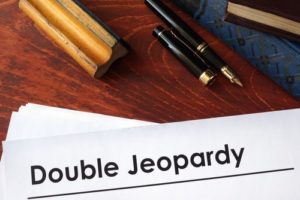
It is not double jeopardy to charge you in state and federal court, provided that you did some act that violated both state and federal laws.
The Double Jeopardy Clause, as guaranteed by the Fifth Amendment to the U.S. Constitution, says that you cannot be prosecuted twice for the same offense. Though jeopardy only attaches, or applies, to prosecutions of the same criminal acts by the same sovereign, or governments.
States are considered “separate sovereigns” from the federal government in the United States. According to the dual sovereignty doctrine, more than one sovereign (such as a state government and a federal government) may prosecute you without violating double jeopardy, if you break the laws of each sovereignty.
What is double jeopardy?
The Double Jeopardy Clause has been written into the Fifth Amendment of the U.S. Constitution. The clause guarantees that there will be:
- no prosecution after an acquittal for the same offense,
- no double convictions for the same offense and,
- no multiple punishments for the same offense.
The Double Jeopardy Clause has also been adopted into California state law through California Penal Code 687.1
It is a deeply entrenched concept of criminal law that a State should not be allowed to make repeated attempts to convict you for an alleged offense. The government possesses immense powers and resources. Repeated attempts at a criminal conviction subjects you to undue embarrassment and expense. It also increases the chances that an innocent person may be found guilty.
What is the dual sovereignty doctrine?
The dual sovereignty doctrine states that more than one sovereign may prosecute you, without violating the prohibition against double jeopardy, if you break the laws of each sovereignty. Since the states are considered separate sovereigns from the federal government, each sovereign can charge you without violating double jeopardy.
So, for example, Officers of the Los Angeles Police Department, were tried and found not guilty of assault on Rodney King in Ventura County Superior Court in 1991.
Some of those same officers, though, were later charged and convicted in federal court for violating Rodney King’s civil rights.
The federal charges and convictions arose out of the same incident as the previous state case in Ventura County Superior Court. However, because the state of California and the federal government are separate sovereigns, double jeopardy did not bar the prosecution of those officers in federal court.2
What if I was already prosecuted by a state or the federal government?
The above analysis does not change if you were already prosecuted, and even convicted, in state court or federal court. This means that even if you were prosecuted for a charge in state court, you can still be prosecuted for the same act in federal court if the act was also a federal offense. The converse is also true.3
Are there other situations where double jeopardy does not apply?
There are some situations where double jeopardy does not apply. The most common include:
- civil proceedings arising from the same facts as criminal proceedings – double jeopardy only protects against repeated attempts at criminal prosecution. Thus, a prior civil court proceeding does not prevent a subsequent criminal prosecution, even though both cases may arise from the same events.4
- criminal pre-trial proceedings – jeopardy does not apply to a criminal case until you are placed on trial. This means criminal proceedings that occur prior to the trial do not give rise to the double jeopardy defense.5
- prison disciplinary proceedings – disciplinary actions taken against prison inmates for violations of prison conduct, do not bar subsequent criminal prosecution for the same conduct.6
- new trial or reversal on appeal – if you are convicted but the court then grants your motion for a new trial, or if the judgment of conviction is reversed on appeal, the new trial is treated as if there had been no previous trial. Thus, double jeopardy will not be a defense at the new trial.7
- discharge by necessity – if a case is dismissed as a result of a legal necessity, double jeopardy will generally not bar a subsequent prosecution. Legal necessity arises from:
- a juror’s illness or other incapacity,
- a juror’s absence,
- the inability of the jurors to agree (hung jury), or
- the incapacity or absence of you, the defense counsel, or the judge.8
Additional reading
For more in-depth information, refer to these scholarly articles:
- Double Jeopardy and Dual Sovereignty: A Critical Analysis – William & Mary Law Review.
- Double Jeopardy, Two Sovereignties and the Intruding Constitution – University of Chicago Law Review.
- The Problem of Double Jeopardy in Successive Federal-State Prosecutions: A Fifth Amendment Solution – Stanford Law Review.
- Double Jeopardy and Multiple Sovereigns: A Jurisdictional Theory – Washington University Law Review.
- Double Jeopardy, It’s Complicated: The Intricacies of Dual Sovereignty, Due Process, and Legislative Intent – University of California, Davis.
Legal References
- U.S. Const. amend. V. – “nor shall any person be subject for the same offence to be twice put in jeopardy of life or limb.” California Penal Code 687 PC.
- See Double Jeopardy Law After Rodney King – Columbia Law Review.
- See note 1.
- People v. Batey (Cal.App. 1986) 183 Cal.App.3d 1281.
- People v. Finch (Cal.App. 1953) 119 Cal.App.2d Supp. 892.
- In re Davis (1979) 25 C.3d 384.
- People v. Cortez (1998) 18 C.4th 1223.
- California Penal Code 1141 PC. People v. Fields (1996) 13 Cal.4th 289.

